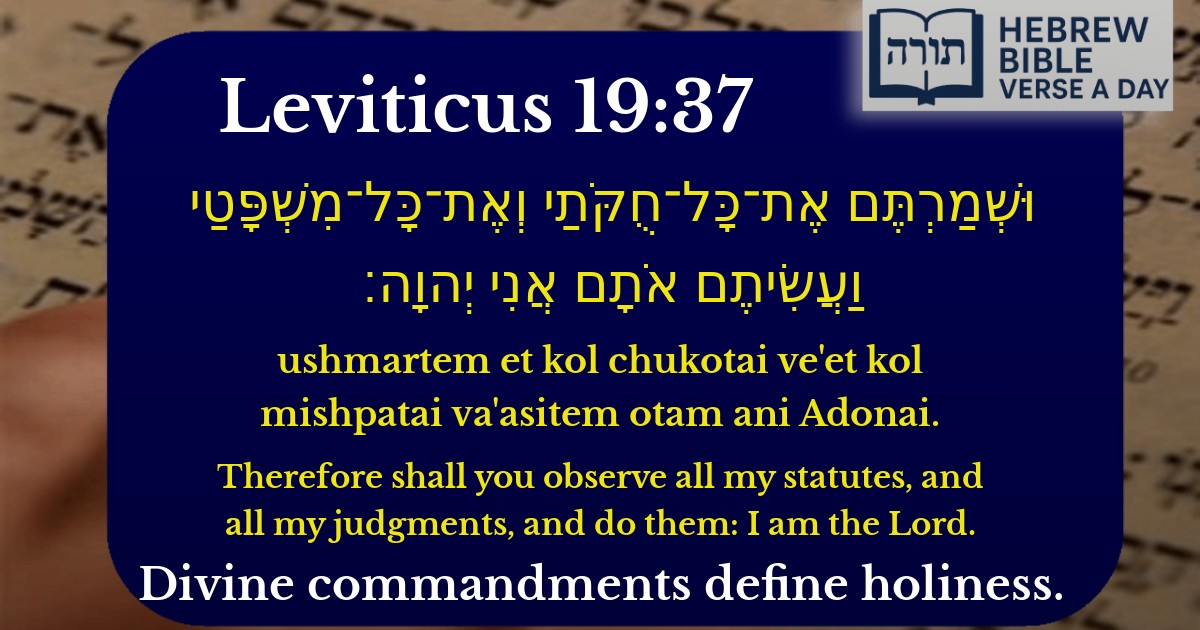Join Our Newsletter To Be Informed When New Videos Are Posted
Join the thousands of fellow Studends who rely on our videos to learn how to read the bible in Hebrew for free!
Hebrew Text
וּשְׁמַרְתֶּם אֶת־כָּל־חֻקֹּתַי וְאֶת־כָּל־מִשְׁפָּטַי וַעֲשִׂיתֶם אֹתָם אֲנִי יְהוָה׃
English Translation
Therefore shall you observe all my statutes, and all my judgments, and do them: I am the Lord.
Transliteration
Ushmartem et kol chukotai ve'et kol mishpatai va'asitem otam ani Adonai.
Hebrew Leining Text
וּשְׁמַרְתֶּ֤ם אֶת־כׇּל־חֻקֹּתַי֙ וְאֶת־כׇּל־מִשְׁפָּטַ֔י וַעֲשִׂיתֶ֖ם אֹתָ֑ם אֲנִ֖י יְהֹוָֽה׃ <span class="mam-spi-pe">{פ}</span><br>
וּשְׁמַרְתֶּ֤ם אֶת־כׇּל־חֻקֹּתַי֙ וְאֶת־כׇּל־מִשְׁפָּטַ֔י וַעֲשִׂיתֶ֖ם אֹתָ֑ם אֲנִ֖י יְהֹוָֽה׃ {פ}
🎵 Listen to leining
Parasha Commentary
📚 Talmud Citations
This verse is quoted in the Talmud.
📖 Yoma 67b
The verse is cited in a discussion about the importance of observing God's commandments, emphasizing that they should be followed because they are divine decrees.
📖 Sanhedrin 56b
The verse is referenced in the context of the Noahide laws, illustrating the broader principle that divine commandments must be upheld.


Understanding the Verse
The verse, "וּשְׁמַרְתֶּם אֶת־כָּל־חֻקֹּתַי וְאֶת־כָּל־מִשְׁפָּטַי וַעֲשִׂיתֶם אֹתָם אֲנִי יְהוָה" (Vayikra 19:37), emphasizes the obligation to observe all of Hashem's statutes (חֻקִּים) and judgments (מִשְׁפָּטִים) and to actively perform them. The concluding phrase, "אֲנִי יְהוָה", underscores the divine authority behind these commandments.
Distinction Between חֻקִּים and מִשְׁפָּטִים
Rashi (Vayikra 19:37) explains that חֻקִּים (statutes) refer to commandments whose reasons are not readily apparent, such as the prohibition of mixing wool and linen (שַׁעַטְנֵז) or the laws of kashrut. These are decrees from Hashem that we follow out of obedience, even if their rationale is unclear. On the other hand, מִשְׁפָּטִים (judgments) are commandments that align with human logic and ethical principles, such as prohibitions against theft or murder, which society would likely establish even without divine revelation.
The Importance of Action: "וַעֲשִׂיתֶם אֹתָם"
The Rambam (Hilchos De'os 1:7) emphasizes that the verse commands not only knowledge of the mitzvos but their actual performance. Mere intellectual understanding is insufficient—Torah observance requires practical implementation in daily life. The Sforno adds that the phrase "וַעֲשִׂיתֶם אֹתָם" implies consistency and diligence in fulfilling mitzvos, not just occasional observance.
Divine Authority: "אֲנִי יְהוָה"
The concluding words, "אֲנִי יְהוָה", serve as a reminder that these commandments are binding because they originate from Hashem Himself. The Midrash (Sifra, Kedoshim 10:12) teaches that this phrase reinforces the idea that we observe mitzvos not for personal gain or societal approval, but because they are the will of the Creator. The Ramban (Vayikra 19:37) further explains that this declaration connects the mitzvos to our emunah (faith) in Hashem’s unity and sovereignty.
Practical Lessons from the Verse